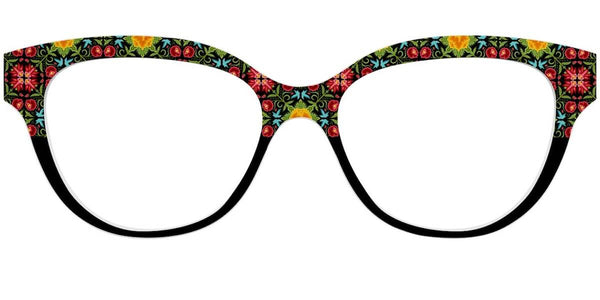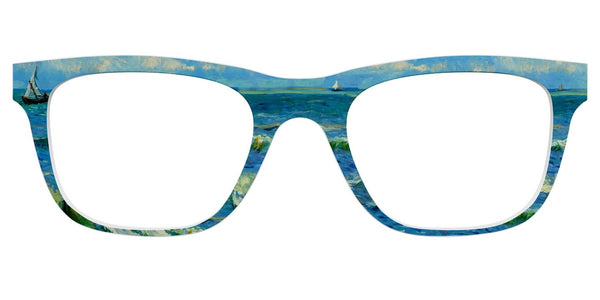
- Blog
- /
- Where to Get the Best Progressive Lenses...
Where to Get the Best Progressive Lenses for You
If you’ve recently been for an eye exam and your optometrist suggested progressive lenses, you may have a few questions. For example, what exactly are progressive lenses and how are they different from bifocals? Are they worth paying extra for?
Read on to find out more about this new type of lens and why it might work better for you than traditional multifocal lenses. We’ll also suggest where to find the best progressive lenses so you can experience clear vision, every moment of every day.
What Are Progressive Lenses?
Progressive lenses are a type of prescription eyeglass lens designed for people who have multiple vision issues.
Regular prescription glasses, on the other hand, are made to help the wearer with one type of vision correction. For example:
-
If you have myopia (in other words, you’re nearsighted), single-vision lenses can strengthen your distance vision.
-
If you have hyperopia (also known as farsightedness), single-vision lenses can support your near vision.
-
If you have astigmatism, which is caused by an irregularly shaped cornea or lens, single-vision lenses can correct that too.
-
If you’ve developed presbyopia (which often happens with age as your lens loses some flexibility), you need reading glasses to magnify objects up close so you can see them clearly.
But what if you need more than one of these types of vision correction?
A prescription for astigmatism can be combined with other types of prescriptions into a single-vision lens, but that’s the only combination that works.
For example, perhaps you need help with both near and far vision, or you’ve always been nearsighted but as you’ve gotten a little older, you’ve developed presbyopia too.
Your options then are to buy multiple pairs of glasses — or to simplify your life and invest in a pair of multifocal or progressive lenses.
How Do Progressive Lenses Work?
All multifocal lenses — whether they’re for glasses or contact lenses — are made up of sections with different lens prescriptions to help you see clearly at any distance.
For example, the top section could have a distance vision prescription, so when you’re looking up — for example, while driving or watching your child play sports — you can see into the distance. The bottom part usually has reading lenses to help you see up close — when you’re usually looking down. If you also need help with the middle distance — for example, for computer work — you may also have a third type of prescription in between.
Progressive lenses are an updated version of old-school bifocal or trifocal eyeglasses, with none of the drawbacks of those original multifocal lenses.
Benefits of Progressive Lenses

The latest technology has given us access to many improvements in prescription glasses. Here’s what we love about progressives.
More Natural Vision
When you’re wearing traditional bifocal lenses, you’ll often experience an unsettling vision jump when you change from distance vision to near vision or vice versa — which you naturally do throughout the day. In contrast, the best progressive lenses offer a smooth transition between the different focal distances.
More Youthful Look
On a more aesthetic level, the old multifocal lens design had very visible lines between the different sections, which many associated with an older generation. The sections of new progressive lenses flow seamlessly from one to the other, so they look exactly like regular, stylish, single-vision glasses.
More Convenience and Value for Money
If you’re not into old-school multifocals, you would need to buy and carry around multiple pairs of glasses. With the best progressive lenses — which most people prefer to old multifocals — you only need one pair of glasses.
Where to Get the Best Progressive Lenses

Firstly, let’s clarify that you can’t buy progressive lenses off the shelf. They need to be custom-made for you.
You could, of course, take the prescription from your eye doctor to the optician in your local mall. But if you’d prefer to shop for the best progressive lenses from the comfort of your own home, you can order Pair Eyewear online.
Pair offers a high-quality range of eyeglass lens types, including progressive lens designs starting at just $259, including the frames. You can even use your FSA or HSA to pay for them, helping you get the most out of your pre-tax dollars.
Our premium progressive lenses are custom-made to match your prescription and your frames. They offer you sharp vision across all your viewing areas, with a seamless transition between near, middle, and far distances.
They’re made from smudge- and scratch-resistant polycarbonate to ensure they can handle daily wear and tear, and they come with an anti-reflective lens coating that helps to cut glare on bright days.
If you’d like to take your new progressive lenses to the next level, you can choose from a range of extra lens options. For example, if you select the transition lens add-on, your glasses will automatically adapt to varying light conditions, darkening as the light in your environment brightens and clearing again when it dims. Alternatively, if you’re often online late at night, you might choose blue light filters to protect your sleep when you eventually get to bed.
But the versatility doesn’t end there.
Once you’ve chosen your favorite Base Frame for your progressive lenses, you get to add as many stylish Top Frames as you like. Highlight the different aspects of your personality by selecting from our vast range of regular Top Frames or Sun Tops — which are an easy way to turn your everyday glasses into sunglasses.
Pair Top Frames attach magnetically to the Base Frame so you can switch them out from day to day — or even moment to moment. Choose from hundreds of different designs across our Collections, Limited Edition, and Collab ranges — and say goodbye to boring glasses forever.
Getting Used to Your New Progressive Glasses

Even the best progressive lenses can take some time to get used to. So if the world looks a little wonky or blurry — especially in your peripheral vision — or you feel off-balance or experience some eyestrain for a couple of weeks, be patient as your eyes and brain go through the process of adapting to your new lenses.
To help yourself adjust, wear your progressive lenses as much as possible and practice good eye care by regularly taking breaks from tasks that require intense focus, so your eyes have a chance to rest. In the meantime, take extra care when walking up or down stairs, and consider not driving until you’re more used to your new glasses.
That said, people who choose Pair progressive lenses experience far less peripheral aberration and they tend to adapt more quickly to their new lenses, so you’ll already be a step ahead with your Pair glasses.
If you’re still having problems after a few weeks, pay another visit to your eye care professional. They can double-check your prescription and also help you make any adjustments to your glasses to make sure they’re sitting in the right place on your face, which is especially important for progressive lenses.
See the World Clearly With the Best Progressive Lenses
Progressive lenses are designed to help you see across the near, middle, and far distance, all in one pair of glasses. Compared to traditional multifocals, they provide a seamless transition between the different fields of vision, offering convenience, value for money, and modern style — especially if you choose to shop at Pair Eyewear.
Visit Pair today to pick out your pair of the best progressive lenses for you. You’ll never see the world the same way again.